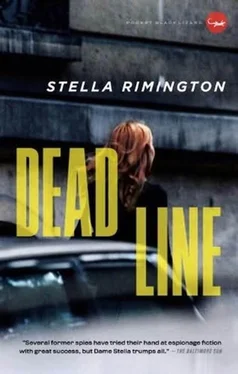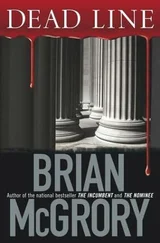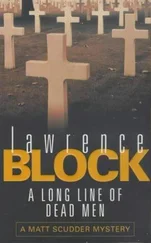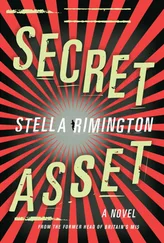‘Off the record?’ Bokus seemed amused for the first time. ‘You sound like a reporter from one of those… what do you call them, red tops?’
Fane inclined his head slightly. ‘Well, perhaps. But between us, I think you and I should have a sort of informal channel of communication. Just to keep in touch – about this matter, of course, and anything else that might crop up. It seems important, given the possible urgency.’
‘Sounds okay to me,’ said Bokus without enthusiasm.
When Fane had left, Andy Bokus picked up the phone and dialled an extension. ‘Miles, could you come back for a minute?’ he said, though it wasn’t really a question.
There was something puppy-like about Brookhaven that annoyed Bokus almost as much as his East Coast manners, his English-style clothes (elbow patches for Christ’s sakes) and his open admiration for all things English.
What kind of a name was Miles Brookhaven anyway? His people were probably landing in Massachusetts while Bokus’s forebears were shovelling shit in the Ukraine. ‘Miles’ for godsake – anybody with a first name like that had ivy twined round his head.
Bokus hadn’t been poor, but unlike most of his Agency colleagues he had come from America’s small-town heartland, where ‘sophisticated’ was not a word used admiringly. But he had always believed in himself, and in the American promise that anyone in that country could, if they worked hard and put their mind to it (and, he admitted to himself, enjoyed a fair share of luck), do anything. When a football injury in his second year at college had put paid to his hopes for a professional career, Bokus had for the first time in his life paid attention to his studies. A political science major, he had known he wanted to see a bigger world than rural Ohio had to offer, so when one of his professors had suggested he take the Agency’s exams, he had seized the chance.
And by now, he’d seen a fair amount of it. His most recent posting before London was Madrid. He spoke Spanish fluently and he had liked the Spanish people – the men were dignified but straightforward, the women often beautiful and full of grace. He’d been there at an interesting time, too – the Madrid train bombings had been a real wake-up call in that country and had put the Agency’s Madrid station into the front line at Langley. He’d done well in Madrid, which was why he’d got this plum job of London.
But he wasn’t as happy here. The English struck Bokus as a sour bunch; snooty, devious when it suited them, willing to rely on American firepower while making it clear they had the superior intellects. Like Fane, who couldn’t ever disguise his obvious conviction that Bokus was an idiot.
Yet it wasn’t Fane’s patronising manner that was worrying him now; it was what Fane had said. You didn’t have to like the Brits – which God knows Bokus didn’t – to respect them. Once they got their teeth into something they shed all their ‘jolly good this’ and ‘jolly good that’ and acted like old-fashioned bloodhounds. They didn’t give up.
Bokus could not be seen to refuse to help the Brits with this high-alert threat to the Gleneagles conference, but he was going to have to walk a tightrope. There would be no doubt at Langley that ‘Tiger’, the source Bokus had spent the last eighteen months running in London under the nose of MI5, was too valuable to jeopardise. If the Brits even got a sniff of him, the shit would hit the fan with a massive splat. Tiger was a source so sensitive that no one else in the CIA’s London station was aware of it. Tiger’s reports went directly to a small group in Langley, who controlled the case. This was top-flight ‘need to know’ and only a handful of people were indoctrinated. If the Brits learned about Tiger, then Langley would, to use an English expression that Bokus actually liked, have his guts for garters.
There was a tap on the open door and he turned and motioned Brookhaven to come in. Brookhaven stood in front of the desk as Bokus, standing behind it, shuffled papers while he thought. ‘Listen,’ he said at last, ‘I want you to do something.’
‘What’s that, Andy?’
‘I want you to get close to this MI5 woman, Carlyle. Okay?’
‘Sure,’ Brookhaven said dutifully. ‘I met her at the Cabinet Office meeting. She seemed perfectly competent, nice actually.’
Where did he learn to talk like that? At prep school? ‘Yeah, well, competent’s just dandy, but make sure you get close to her, and not the other way around. These people act like they’re your best friends. They aren’t, right?’
‘Okay,’ said Brookhaven, but Bokus was warming to his theme. ‘Sure this Carlyle lady will be “perfectly charming”. She’ll coo and chat and give you tea.’ He looked sharply at Brookhaven. ‘She may even act like she’ll give you more than that. But if you close your eyes for the first kiss, when you open them you’ll find she’s swiped your shoes. You got me?’
‘I got you, Andy.’
You better, thought Bokus, but only grunted in reply.
Ben Ahmad left the Syrian Embassy in Belgravia a little before three o’clock, telling his secretary he would not be back until the morning. She was used to his sudden departures and had learned not to ask questions. On his way out, he was glad to see the ambassador was not in. Ahmad reported to him in his capacity as a trade attaché; they both knew his real reporting line ran back to Syria, to the headquarters of the Mukhabarat, the Syrian secret service. The ambassador did not disguise his unhappiness with this arrangement.
Outside, Ahmad glanced at his watch, a handsome Cartier given to him by his wife, who was in Damascus looking after their three small children. His meeting was not until four thirty, but it would take him at least an hour to get there, since there would be several diversions en route.
He was dressed neatly in a dark suit, and carried a raincoat over one arm. With a trim haircut and neat moustache, he was indistinguishable from the thousands of other Middle Eastern men going about their business in London that afternoon. He had worked hard to cultivate this anonymous air.
Walking up to Hyde Park Corner he went down into one of its labyrinthine underground tunnels, and emerged several minutes later on the far side of Park Lane, where he walked to the Hilton. There he joined a bunch of high-spirited American tourists waiting in a small queue for taxis in front of the hotel, giving the doorman a pound coin when it was his turn to enter a cab. Out of earshot of anyone but the driver, he gave his destination as Piccadilly Circus.
There, he got out, and stood for a minute against a disused doorway at the bottom of Shaftesbury Avenue, watching for other taxis that might have followed him. It was difficult in so much traffic to be sure he was not under surveillance; equally, in the hurly burly of the streets here, following him without being noticed would be a difficult task.
He saw nothing untoward, and walked quickly to the Underground entrance. He disliked the area, which he thought epitomised the baffling English love of sleaze. He was faithful to his wife, teetotal, and he simply couldn’t understand a culture that gave such value to infidelity and alcohol.
He had hoped to be back in Syria by now, for his posting had originally been intended to last only six months. Tibshirani had promised him that; otherwise Ahmad would never have left his family behind. But then ‘Aleppo’ had arrived – code name for a source that had appeared out of the blue, full of information so extraordinary that Ahmad had distrusted it at first and relayed only bits and pieces, while he tried to confirm its authenticity.
Yet even these tit-bits had caused consternation in Damascus, enough that Tibshirani had tried to insist on flying to London to manage Aleppo personally. But Aleppo had refused to meet anyone but Ahmad, stressing that if the Syrians tried to push him, he would break off all contact. Tibshirani didn’t dare risk that, especially once the authenticity and value of Aleppo’s information had become indisputable.
Читать дальше












